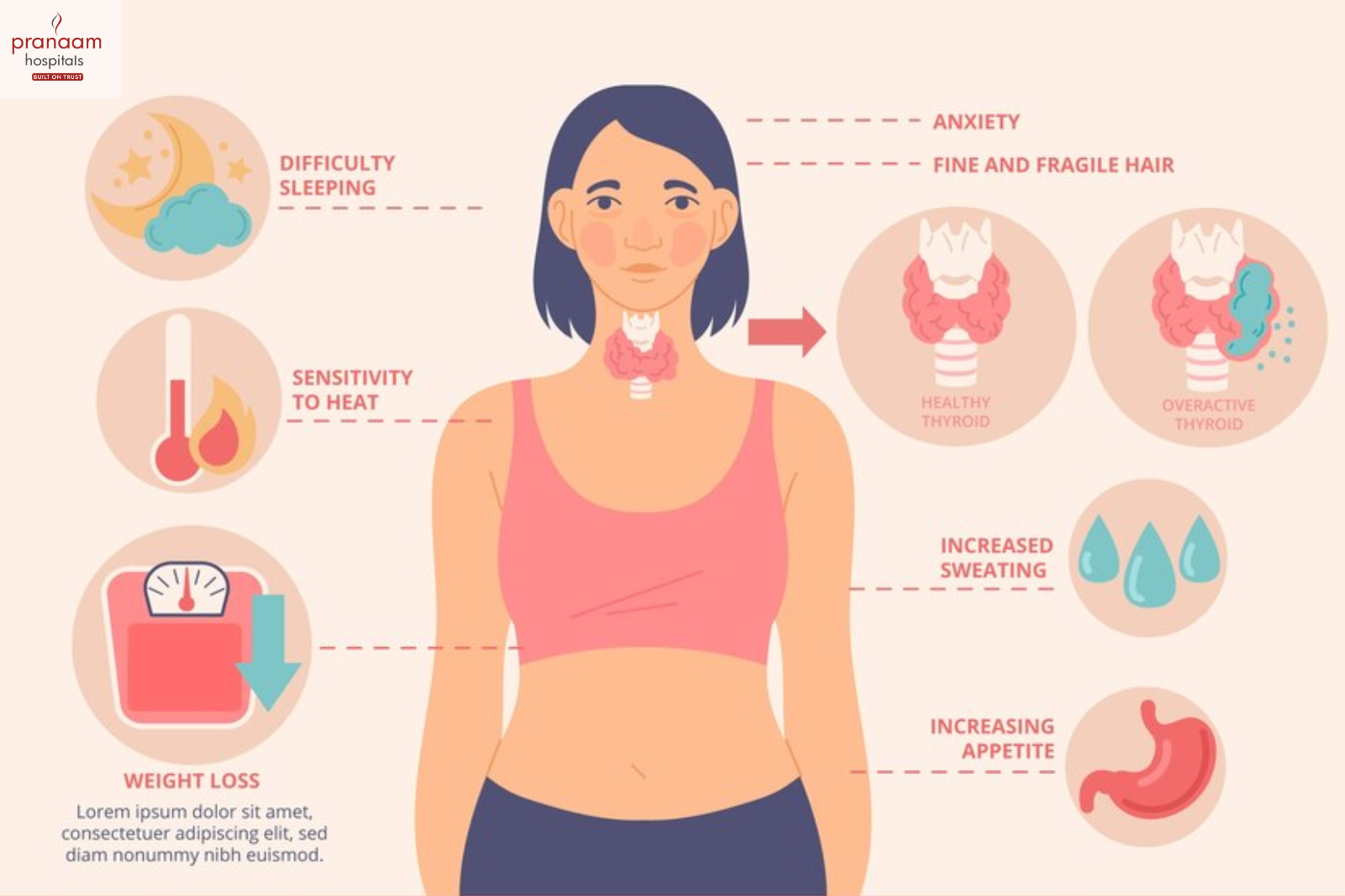A medical condition known as hyperthyroidism is brought on by the thyroid gland producing an excessive amount of thyroid hormones. The thyroid gland, which is found in the neck, produces hormones including triiodothyronine (T3) and thyroxine (T4) that are essential for controlling the body’s metabolism. Overproduction of these hormones can result in a number of symptoms and medical problems.
Symptoms:
Loss of weight despite an increase in hunger is a common sign of hyperthyroidism. Your body burns calories more quickly, which causes you to lose weight accidentally even when you eat the same or more.
Palpitations, or rapid or irregular heartbeat: Excess thyroid hormones can cause palpitations, anxiety, and even tremors by quickening your heart rate.
Anxiety and irritability: The hormonal imbalance may cause you to feel more anxious, have mood swings, and have trouble focusing.
Fatigue and sleep issues: The body’s increased activity may make it difficult for you to fall or remain asleep, even when you feel exhausted.
Heat sensitivity and increased sweating: Even in cool weather, you will feel warm and sweaty due to your body’s higher heat generation caused by a faster metabolism.
Additional symptoms may include hand tremors, muscle weakness, diarrhoea, frequent bowel motions, menstruation abnormalities, skin changes, hair loss, and enlarged eyes (exophthalmos, especially in Graves’ illness).
Reasons behind hyperthyroidism:
With Graves’ Disease, the thyroid gland is mistakenly attacked by the immune system, causing an excess of thyroid hormones to be produced.
The development of nodules or masses on the thyroid gland that release too much thyroid hormone is known as toxic nodular goitre.
Thyroiditis: Temporary elevation in thyroid hormone levels may result from thyroid gland inflammation.
Excessive iodine consumption: Hyperthyroidism can result from consuming an excessive amount of iodine through food or medication.
Thyroid cancer: Though uncommon, some forms of thyroid cancer have the potential to cause an excess of thyroid hormones.
Overdosing on thyroid hormone replacement therapy: Hyperthyroidism can result from using too much thyroid hormone medication.
Foods to avoid:
It’s crucial to watch what you eat if you have hyperthyroidism since some foods might make symptoms worse or affect thyroid function. Remember that everyone reacts differently to food, therefore it’s critical to develop a customised strategy in collaboration with your physician or a trained dietitian. For those with hyperthyroidism, the following basic suggestions regarding foods to avoid are provided:
Iodine-rich foods: While iodine is a necessary vitamin for thyroid function, excessive amounts can aggravate hyperthyroidism. Iodine-rich foods including kelp, seaweed, iodized salt, and shellfish should be avoided or consumed in moderation.
Foods that are goitrogenic: These meals include ingredients that may affect thyroid function. Even though boiling frequently neutralises these chemicals, consuming them in moderation is still suggested. Broccoli, Brussels sprouts, cauliflower, kale, spinach, cabbage, and soy products are a few examples.
Caffeine: Excessive caffeine intake can aggravate hyperthyroidism symptoms including jitters and elevated heart rate. Reduce the amount of caffeinated liquids you consume, such as tea, coffee, and some energy drinks.
Processed and sugary foods: Consuming fewer processed and sugary foods is advised because a healthy, well-balanced diet is crucial for general health. These may cause weight gain, which some hyperthyroidism sufferers may find concerning.
Overindulgence in high-fiber foods: Although fibre is generally good for the digestive system, eating too much of it might affect how well thyroid drugs are absorbed. It’s critical to have a healthy balance and talk to your doctor about any worries you may have.
Alcohol: Drinking too much alcohol might affect thyroid function and have interactions with some drugs. It’s advisable to minimise alcohol consumption and talk to your doctor about any problems.
Take note that every person has different nutritional requirements, so it’s important to speak with your doctor or a certified dietitian to create a customised plan based on your particular health condition, prescription drugs, and way of life. They can offer advice on how to manage your hyperthyroidism while eating a balanced diet that promotes your general health.
Also Read: Benefits of practicing yoga for cardiovascular health
Postpartum care tips for new mothers
